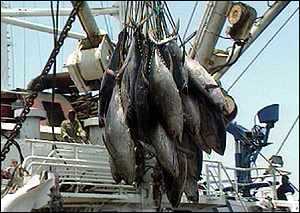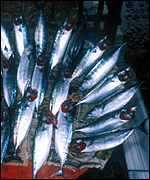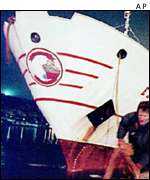|
Foreign fishing methods soon began to destroy West Africa's delicate marine ecology.
Brian O'Riordan works with a campaign group, the International Collective in Support of Fish Workers, based in Belgium.
He says: "The ecosystem in tropical waters is very fragile, and very vulnerable to the industrial trawling techniques used by the EU.
"This has been described as being akin to clear-felling in a forest. They're catching everything now, the small fish, the uneconomic fish.
"So out of the catch they make, possibly they keep anything between 10 and 20%. But anything from 80-90% is chucked back in the water dead.
"And very often these are the fish that form the backbone of the artisanal fishery. Not only are the trawlers clear-felling, they're also turning the ecosystem into a kind of waste dump."
Steffan Smidt, director-general for fisheries of the European
Commission, denies this.
Feeding the rich
He tells the TVE crew: "We always take resources which are
commensurate with the needs of sustainability, and our vessels
are subject to rules covering the number and nature of their nets,
the mesh sizes, and other technicalities.
"I think overall what we are able to catch is only something like
7% of what you can take within Senegalese waters."
|


